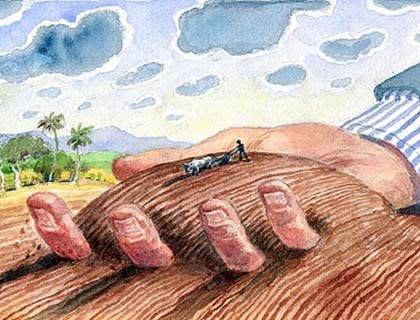
Pope Benedict XVI’s recent eight-day pilgrimage to Jordan, Israel and the Palestinian territories can best be understood in historical perspective.
When in 1904 Theodor Herzl, founder of Zionism, turned to Pope Pius X for support for a Jewish state, he was told that until the Jewish people converted to Christianity, the Church would do nothing to establish a Jewish state and that Roman Catholic priests would be waiting on the shores of Palestine to convert those pioneers who returned to Palestine.
Fast forward 60 years to January, 1964, and the first ever papal visit to Israel – by Pope Paul VI. During his short unofficial trip to Israel – it lasted only 11 hours – Paul VI never once uttered the name of the State of Israel, refused to call Zalman Shazar “President”, and went out of his way to avoid using the word Jews.
With Catholic triumphalism still the official theology, the Vatican viewed Israel as a non-country, and its people as persona non grata. Paul VI even used the occasion to praise his mentor Pope Pius XII, defending the latter’s silence during the Holocaust.
The following year, the Vatican issued the historic Nostra Aetate declaration on the relation of the Church to non-Christian religions. Nostra Aetate ultimately led to the Holy See and Israel establishing diplomatic ties in 1993.
Those relations reached their apogee in March 2000 when Pope John Paul II arrived for the first-ever official papal visit to the Holy Land. The Polish-born pontiff blessed Israel, an act seen by many Israelis as final church recognition of their state and repudiation of the Catholic Church’s centuries-long teaching of contempt that the Jews’ exile was punishment for the death of Jesus.
But the current pontiff Joseph Ratzinger is no Karol Wojtyła. The former was a member of the HitlerJugend in his native Germany before being drafted into Hitler’s Wehrmacht; the latter grew up in Nazi-occupied Poland and was a witness to the Holocaust. Moreover John Paul II was a figure of enormous charisma and charm while his successor is widely seen as aloof.
Benedict XVI’s official visit must be seen against this background. The visit got off to an inauspicious start during the pontiff’s visit to Yad Vashem. While beatitude is in the eye of the beholder, the Pope angered many Israelis by refusing to visit the Holocaust memorial’s museum – which contains a panel criticizing Pope Pius XII’s role during World War II. Even more offensive was Benedict XVI’s speech.
“A few points were missing in the pope’s address. There was no mention of the Germans, or Nazis, who carried out the massacre. There was not a word of sharing the grief or of compassion or pain for the six million victims,” Rabbi Yisrael Meir Lau, a former chief rabbi and now chairman of the Yad Vashem Council, told Israel TV Channel One shortly afterwards.

Benedict had stated that “the Catholic Church feels deep compassion for the victims remembered here.” But given the pope’s personal background as a conscript in the Hitler Youth, Lau insisted, “I personally missed hearing a tone of sharing the grief. I missed hearing ‘I’m sorry, I apologize.’”
The lack of remorse led many Israelis to see Benedict XVI as a mere bean counter concerned primarily with resolving a real estate squabble outstanding since 1993. The Vatican is insisting that Israel surrender control of six religious sites – the Church of the Annunciation in Nazareth; the Coenaculum on Mount Zion in Jerusalem, where Jesus is said to have held The Last Supper; Gethsemane, which sits at the foot of the Mount of Olives in Jerusalem; Mount Tabor; and the Church of the Multiplication, which hugs the shoreline of the Sea of Galilee.
That land grab, and the suspicion that the Vatican secretly supports dividing Jerusalem into Israeli and Palestinian sectors, drove Bob Kunst of Miami Beach to come to Rome and Jerusalem via the Durban II conference in Geneva.
At a raucous protest in downtown Jerusalem’s Zion Square May 11 during the pontiff’s visit to Yad Vashem, Kunst and a phalanx of shofar blowers from his Shalom International organization told the media, “I’m here to tell Benedict XVI ‘Hands off Jerusalem’. It’s the eternal capital of the Jewish people, and there’s nothing to negotiate. Period.”
Kunst and his fellow protestors demanded that the Pope turn over the scores of illuminated Hebrew manuscripts in the Vatican Library. They asked that the papal archives be opened to researchers to definitively establish whether the relics of Herod’s Temple destroyed by the Roman legionnaires in 70 C.E. and then carried off by Titus to Rome are still secretly hidden there.
While Israel’s postal service celebrated Benedict XVI’s state visit with a souvenir sheet of stamps, the Israeli public was far less impressed. Many wondered whether the cost of providing 80,000 police and security officers was worth the bother, and complained about the monumental traffic chaos caused by the Pope’s procession.
On Saturday, the satirical page of the Yediot Ahronot daily had a “quote” from an anonymous Jerusalem resident: “I expected him to apologize. At least for the traffic jams. But nothing. Anti-Semite.”
Gil Zohar is a journalist and tour guide in Jerusalem, Israel.
The words of this author reflect his/her own opinions and do not necessarily represent the official position of the Orthodox Union.



